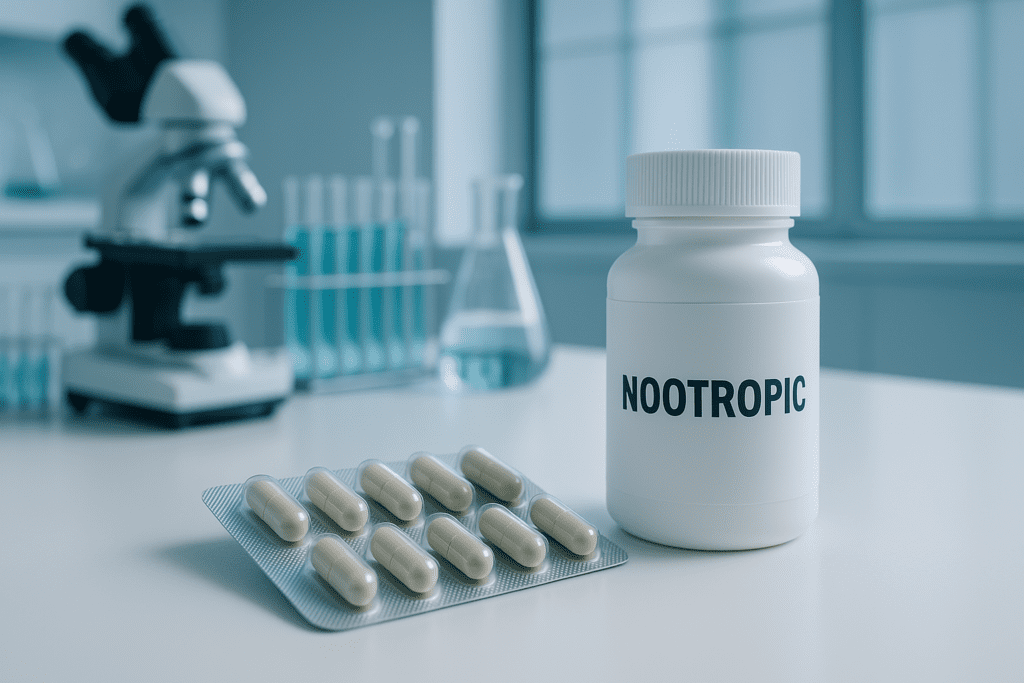In today’s fast-paced, hyper-connected world, maintaining mental clarity and sustained attention is no longer just a desirable trait; it has become essential for navigating both personal and professional life. As the science of nootropics evolves and public awareness of cognitive health deepens, more people are exploring the potential of these compounds not only for immediate productivity but also for long-term brain preservation. But with a growing market full of claims, choices, and misinformation, selecting the right focus nootropic and determining where to buy nootropics with credible scientific backing can be a daunting endeavor. This article provides a comprehensive, evidence-based guide to help you make informed decisions rooted in neuroscience, longevity research, and practical experience.
You may also like: Best Rated Nootropics for Brain Health: Top Supplements to Enhance Focus, Memory, and Longevity
Understanding Focus Nootropics: More Than a Productivity Hack
While the term “nootropic” is often associated with college students cramming for exams or Silicon Valley executives seeking a competitive edge, the true scope of focus nootropics extends far beyond short-term productivity. A focus nootropic is a compound or supplement specifically designed to enhance attention, mental stamina, and executive function. However, the most effective nootropics don’t just amplify cognitive performance in the moment; they also help protect neuronal health and reduce age-related cognitive decline.
The modern conceptualization of nootropics traces back to the 1970s, when Romanian psychologist and chemist Corneliu Giurgea coined the term to describe substances that could enhance learning and memory while being safe and neuroprotective. This foundational principle has grown into a broader field of research that investigates how focus nootropics can play a role in cognitive longevity—supporting mental performance not just today, but over the decades to come. For a nootropic to meet this higher standard, it must demonstrate benefits in areas such as synaptic plasticity, mitochondrial function, neurogenesis, and the mitigation of neuroinflammation.
Why Cognitive Longevity Matters in Nootropic Selection
Cognitive longevity refers to the preservation of mental acuity, memory, and executive function well into older age. While everyone naturally experiences some decline over time, research increasingly shows that lifestyle interventions—including nutrition, physical activity, stress management, and supplementation—can slow or even reverse elements of this process. Focus nootropics designed with longevity in mind differ from their more superficial counterparts. Rather than providing a fleeting burst of energy or dopamine-driven motivation, these compounds aim to nurture the brain’s architecture over time.
This is particularly relevant when you consider the growing prevalence of age-related neurodegenerative diseases such as Alzheimer’s and Parkinson’s. Even in the absence of disease, the normal aging brain is susceptible to reduced processing speed, diminished working memory, and impaired attentional control. High-quality nootropics that are supported by clinical trials and mechanistic studies can serve as a preventative tool, reducing oxidative stress, supporting blood flow to the brain, and encouraging the synthesis of key neurotransmitters.
Cognitive Reserve: The Missing Link in Longevity Discussions
Cognitive longevity is not just about preventing decline—it’s also about building cognitive reserve, the brain’s ability to compensate for aging or damage. Lifestyle interventions like bilingualism, music training, and social engagement increase this reserve. Interestingly, some nootropics, especially those that enhance BDNF (brain-derived neurotrophic factor), may accelerate the formation of new neural pathways, indirectly increasing cognitive reserve. Lion’s Mane mushroom, for instance, promotes nerve growth factor (NGF) synthesis and has been linked to neuroplasticity. Strategically combining these types of nootropics with cognitively enriching activities could be a powerful formula for long-term mental agility.

How to Evaluate a Focus Nootropic for Long-Term Use
Choosing the right focus nootropic involves far more than reading online reviews or chasing the latest trends. A rigorous evaluation should begin with ingredient transparency. Look for products that disclose not only their active compounds but also their dosages and standardization levels. Standardized extracts ensure consistent potency, which is critical when targeting neurophysiological processes. For example, Bacopa monnieri is a well-known adaptogenic herb with cognitive benefits, but its effects are dose-dependent and contingent on the presence of bacosides—the herb’s active phytochemicals.
Equally important is the scientific validation behind each ingredient. Does the nootropic contain substances supported by randomized, placebo-controlled trials? Are there peer-reviewed studies demonstrating improvements in focus, working memory, or mental clarity? Furthermore, investigate the bioavailability of each compound. Ingredients such as curcumin, for instance, require formulation enhancements (like pairing with piperine) to be effectively absorbed by the body. A nootropic may include a laundry list of promising ingredients, but if those compounds cannot cross the blood-brain barrier or are rapidly metabolized, their presence is more marketing than medicine.
The Gut-Brain Axis and Its Influence on Nootropic Efficacy
Emerging evidence underscores the importance of the gut-brain axis in modulating cognitive performance. This bidirectional communication network involves neural, hormonal, and immunological signaling between the gastrointestinal tract and the central nervous system. Interestingly, certain focus nootropics may exert part of their effects indirectly—by altering the gut microbiota composition or enhancing intestinal barrier function. For example, compounds like polyphenols, prebiotic fibers, and fermented nootropics such as Lactobacillus plantarum have demonstrated cognitive benefits potentially mediated through microbiome modulation. If long-term brain health is the goal, supporting a healthy gut environment may amplify or sustain the effects of even the most well-designed nootropic stacks.
Stack Synergy: How Nootropics Can Enhance Each Other’s Effects
While individual nootropics can provide isolated benefits, their real power often lies in synergistic stacking. For instance, pairing CDP-choline with racetams can enhance memory consolidation more effectively than either alone. Another example is the combination of L-tyrosine and Rhodiola rosea, which together support dopamine production while buffering against stress-induced neurotransmitter depletion. Intelligent stack design, rooted in complementary mechanisms rather than redundant ones, allows for lower dosages, reduced side effects, and more sustainable cognitive enhancement. Future developments in AI-assisted supplement planning may take this a step further, tailoring stacks to individual biochemistry and lifestyle.
Circadian Rhythms and Timing Nootropic Use for Maximum Effect
One often overlooked variable in nootropic effectiveness is when you take them. Human cognitive performance follows a circadian rhythm, peaking and dipping at different times of day. For instance, alertness tends to peak mid-morning and again in the early evening, while memory consolidation is stronger in the afternoon. Certain nootropics, like caffeine, modafinil, or phenylpiracetam, can disrupt sleep if taken too late. Others, like magnesium threonate or phosphatidylserine, may actually enhance sleep architecture and are better suited for evening use. Aligning your focus nootropic regimen with your body’s natural rhythms could improve both short-term outcomes and long-term cognitive resilience.
Safety and Tolerability: Long-Term Considerations
While the allure of cognitive enhancement can tempt even the most cautious individual, safety should always remain the top priority—especially when taking supplements over the long term. One of the key advantages of focus nootropics with scientifically validated ingredients is that their safety profiles are often well-characterized. Look for compounds with a long history of use in traditional medicine or those that have passed through toxicology assessments in both animal and human studies.
Caffeine, for example, is an effective and widely studied nootropic that can boost alertness and reaction time. However, its chronic use can lead to tolerance, dependency, and disrupted sleep—each of which can undermine long-term cognitive health. Contrast this with L-theanine, an amino acid found in green tea that has been shown to promote alpha brainwave activity, fostering a state of relaxed alertness without sedation. When used together, caffeine and L-theanine can provide synergistic benefits, enhancing focus while minimizing the overstimulation often associated with caffeine alone. This illustrates the importance of formulation: the best focus nootropics are not just about what they contain, but how those components work in concert to achieve balanced effects.

Avoiding Overhyped or Understudied Compounds
In an industry where marketing often outpaces science, discerning consumers must remain vigilant. Many products make bold claims based on animal studies or in vitro experiments that do not translate to meaningful results in humans. Others rely on proprietary blends, obscuring the actual dosages of active ingredients and making it impossible to assess their efficacy.
The desire to buy nootropics should be tempered with a healthy skepticism of “miracle” supplements that promise instant results. Instead, prioritize those that demonstrate consistency, clinical backing, and realistic expectations. Cognitive enhancement is a gradual process that builds over weeks and months, not minutes. Products that emphasize cumulative benefits and encourage lifestyle integration tend to align more closely with the goal of cognitive longevity.
The Role of Adaptogens and Neuroprotective Botanicals
One of the most exciting trends in nootropic development is the increasing integration of adaptogens—natural substances that help the body adapt to stress and maintain homeostasis. Many adaptogens also possess neuroprotective properties, making them ideal candidates for inclusion in focus nootropic formulas aimed at long-term brain health.
Ashwagandha (Withania somnifera), for example, has been shown to reduce cortisol levels and improve stress resilience, which can indirectly support better focus and cognitive performance. Rhodiola rosea is another adaptogen that enhances mental stamina, especially under conditions of fatigue or emotional stress. When paired with traditional nootropics like citicoline or acetyl-L-carnitine, these botanicals can form a robust foundation for sustainable mental performance.
Of course, the sourcing and preparation of these botanicals matter greatly. Standardized extracts ensure therapeutic consistency, while ethical harvesting and clean manufacturing practices contribute to the safety and integrity of the final product. Consumers seeking to buy nootropics should look for certifications such as NSF, GMP (Good Manufacturing Practices), or third-party testing to ensure product purity and authenticity.
Mitochondrial Health and Energy Metabolism
A less commonly discussed but vital aspect of cognitive longevity is mitochondrial function. Mitochondria are the energy-producing organelles within cells, and their efficiency directly influences cognitive stamina, mental clarity, and resistance to neurodegeneration. Emerging research points to the role of mitochondrial dysfunction in age-related cognitive decline and mood disorders.
Nootropic compounds that support mitochondrial health include Coenzyme Q10 (CoQ10), alpha-lipoic acid, and PQQ (pyrroloquinoline quinone). These substances enhance cellular energy production, reduce oxidative stress, and promote mitochondrial biogenesis—the creation of new mitochondria. When included in a focus nootropic formulation, such compounds can provide an additional layer of support for long-term brain resilience. While these may not provide the immediate stimulation associated with compounds like caffeine or modafinil, their contribution to cellular vitality is indispensable for cognitive longevity.
How Neuroinflammation Impacts Focus and Brain Aging
Another emerging area of focus in nootropic science is the relationship between neuroinflammation and cognitive performance. Chronic inflammation in the brain, often fueled by stress, poor diet, sleep deprivation, or environmental toxins, can impair synaptic function and accelerate neuronal degradation. This process not only affects memory and mood but also diminishes focus and attentional control.
Nootropic ingredients such as curcumin, resveratrol, and omega-3 fatty acids have demonstrated anti-inflammatory effects in the brain. These compounds help inhibit pro-inflammatory cytokines and promote neurogenesis, making them valuable assets in any formulation aimed at preserving cognitive function. When choosing a focus nootropic, consider whether it includes ingredients that target inflammation at the cellular level. A comprehensive product will do more than just stimulate neurotransmitters—it will also modulate the brain’s internal environment to create conditions for long-term cognitive thriving.
Personalization and the Future of Precision Nootropics
Perhaps the most revolutionary shift on the horizon is the move toward personalized nootropics—formulas tailored to an individual’s genetic profile, cognitive goals, and lifestyle. As our understanding of nutrigenomics and the gut-brain axis expands, so too does the potential for hyper-customized solutions. Individuals with COMT gene variants, for example, metabolize dopamine differently and may respond more favorably to certain nootropics than others.
While this level of personalization is still in its infancy, some companies are already offering DNA-based supplement recommendations or at-home neurochemical testing kits. Until these services become widely accessible and validated, users can still take a personalized approach by starting with single-ingredient nootropics and journaling their responses over time. This strategy allows for greater insight into what works, what doesn’t, and how various combinations influence focus, mood, and mental endurance.
Where to Buy Nootropics Backed by Science
With growing demand comes a proliferation of options, many of which fail to meet basic quality standards. To buy nootropics with confidence, prioritize vendors who provide transparent sourcing, clear ingredient labeling, and links to peer-reviewed studies. Brands that invest in third-party testing and publish Certificates of Analysis (COAs) on their websites are more likely to produce consistent, reliable products.
Respected online platforms such as Nootropics Depot, Pure Nootropics, and Double Wood Supplements have earned credibility by offering scientifically vetted products with clear documentation. Additionally, some functional medicine clinics and integrative health practitioners offer personalized nootropic recommendations based on clinical testing and ongoing patient monitoring.
Avoid marketplaces or retailers that make exaggerated claims, use vague terminology like “brain booster,” or hide behind proprietary blends. Instead, opt for brands that focus on education, transparency, and customer feedback. Reputable vendors will not only sell products but also provide guidance on how to use them safely and effectively over the long term.
Frequently Asked Questions: Focus Nootropics for Cognitive Longevity
1. Can a focus nootropic help reduce mental fatigue during emotionally stressful periods?
Yes, a high-quality focus nootropic can support mental stamina during emotionally taxing times by stabilizing neurotransmitter levels and modulating the body’s stress response. Compounds like Rhodiola rosea and L-theanine have been shown to lower cortisol while preserving cognitive clarity, making them valuable during extended periods of emotional strain. However, it’s important to understand that while a focus nootropic can improve resilience, it is not a replacement for addressing the root causes of emotional distress. Many users find that combining nootropics with mindfulness, therapy, or behavioral strategies leads to longer-lasting cognitive benefits. When used strategically, a focus nootropic can offer psychological cushioning that helps prevent burnout without blunting emotional awareness.
2. What should I consider when deciding where to buy nootropics online?
When planning to buy nootropics online, prioritize sources that provide transparent ingredient sourcing, third-party testing, and Certificates of Analysis (COAs) for each batch. It’s also wise to look for retailers that specialize in cognitive health rather than generic supplement platforms, as they are more likely to stock well-formulated, research-supported products. Be wary of marketing language that promises instant results or uses vague terms like “brain booster” without supporting clinical evidence. Reputable vendors should also offer detailed usage guidelines and educational content to support informed decision-making. Above all, choose companies that demonstrate an ongoing commitment to safety, quality assurance, and user feedback—core pillars of EEAT in health-related commerce.
3. How does chronic multitasking affect the way a focus nootropic works?
Multitasking places a high cognitive load on the brain’s executive function systems, often depleting attention, working memory, and decision-making speed. While a focus nootropic may temporarily enhance cognitive throughput, chronic multitasking can still reduce its effectiveness by increasing mental noise and fragmenting attention. To counteract this, users should adopt structured work methods like time-blocking or single-tasking while taking their nootropic stack. This approach can amplify the benefits of a focus nootropic by aligning cognitive effort with enhanced neurotransmitter activity. Essentially, nootropics work best when paired with behavior that respects the brain’s natural limits.
4. Is there an optimal age range for starting focus nootropics for long-term brain health? There is no universal age to start taking nootropics, but emerging evidence suggests that beginning in early adulthood—around age 25 to 35—may offer the most proactive advantage. This is typically when natural levels of neurogenesis and synaptic plasticity begin to slow, making it a strategic window to support cognitive longevity. People in high-stress, cognitively demanding careers often notice benefits sooner when introducing a focus nootropic during this phase of life. However, those in midlife or older can still see meaningful improvements, particularly when nootropics are combined with physical exercise, sleep optimization, and a nutrient-dense diet. Regardless of age, the decision to buy nootropics should always be grounded in individual health status, goals, and scientific guidance.
5. Can stacking different focus nootropics lead to better results, or is it riskier?
Stacking, or combining multiple focus nootropics, can lead to synergistic effects when done thoughtfully. For instance, pairing L-tyrosine with citicoline may improve dopamine balance and memory encoding, especially under stress. However, stacking can also introduce the risk of overlapping effects or unintended interactions, particularly if ingredients influence the same neurological pathway. To stack safely, start with low doses and monitor your response over time, adjusting based on cognitive needs and how your body reacts. Some advanced users create personalized stacks based on cognitive goals, while newcomers may benefit from pre-formulated blends with clinically studied ratios. If you’re planning to buy nootropics for stacking, choose products from brands that disclose exact dosages and mechanisms of action.
6. How can I tell if a focus nootropic is affecting my creativity, not just my focus? Creativity involves more than attention—it draws on divergent thinking, pattern recognition, and abstract reasoning. Some focus nootropics, especially those that increase alpha brainwave activity or boost acetylcholine levels, can enhance these faculties. For example, Lion’s Mane mushroom has shown potential to promote neuroplasticity, which can support novel idea formation. To assess whether your creativity is improving, track tasks that require innovative thinking, such as writing, designing, or problem-solving. If you’re using a focus nootropic but feel mentally rigid or overly linear, it may be time to adjust your stack or shift to a different compound that promotes cognitive flexibility.
7. Are there any common mistakes people make when they first buy nootropics?
Yes, one frequent mistake is prioritizing hype over evidence. Some buyers rush to try trending products without understanding how or why they work, leading to mismatched expectations or ineffective use. Another common misstep is ignoring dosage thresholds—taking too much too soon or not giving the body time to adapt. Additionally, some users skip foundational health practices, assuming that a focus nootropic can compensate for poor sleep, high stress, or nutritional gaps. Long-term success with nootropics depends on a comprehensive cognitive wellness strategy. Anyone looking to buy nootropics should begin with well-researched products and track both short-term effects and long-term patterns.
8. How does neuroplasticity influence the effectiveness of a focus nootropic over time? Neuroplasticity—the brain’s ability to reorganize and form new connections—is central to how we learn and adapt. A focus nootropic that promotes neuroplasticity may yield compounding benefits over time, as it strengthens neural networks related to attention, memory, and problem-solving. However, for this process to take root, nootropics must be paired with cognitive effort: learning a language, solving puzzles, or mastering new skills. Passive consumption of nootropics without mental engagement may still offer mild benefits, but the most powerful outcomes emerge when the brain is actively challenged. Therefore, the goal isn’t just to buy nootropics—it’s to integrate them into a lifestyle that promotes mental growth.
9. Can a focus nootropic impact mood and emotional regulation as well as attention? Many focus nootropics have crossover effects on mood due to their influence on neurotransmitters like dopamine, serotonin, and GABA. For example, compounds like L-theanine and saffron extract are known to improve focus while also reducing symptoms of mild anxiety and emotional volatility. The connection between attention and emotion is neurologically intertwined; improved focus can help individuals become more present, while emotional stability can enhance sustained attention. That said, nootropics are not a substitute for professional mental health treatment. Users who notice mood changes—positive or negative—should track those responses and consider consulting a healthcare professional when deciding whether to continue or buy nootropics for ongoing use.
10. What role might AI and wearable tech play in the future of focus nootropics?
Artificial intelligence and biometric monitoring are revolutionizing how we understand the brain’s response to nootropics. Wearable EEG devices and neurofeedback tools can now track brainwave patterns in real time, offering insights into which focus nootropic produces the most desirable cognitive state. In the near future, AI-driven apps may recommend personalized nootropic regimens based on real-time data, sleep patterns, or hormonal fluctuations. These innovations will enable users to fine-tune their cognitive enhancement strategies with unprecedented precision. As the technology matures, those looking to buy nootropics will have access not just to pills and powders, but to integrated platforms that optimize brain health dynamically and continuously.

Conclusion: Choosing a Focus Nootropic with Cognitive Longevity in Mind
In the quest for sharper focus and lasting mental vitality, the value of choosing the right focus nootropic cannot be overstated. The best formulations do more than enhance attention in the moment—they protect, nourish, and strengthen the brain over time. By focusing on compounds with strong scientific backing, proven safety profiles, and mechanisms that support cognitive longevity, you can make informed choices that align with your personal health goals.
Equally important is knowing where to buy nootropics that reflect these principles. Seek out vendors who prioritize transparency, quality control, and evidence-based formulations. Resist the temptation of quick fixes or flashy marketing and instead embrace the steady, cumulative gains that come from consistent, intelligent use of nootropics grounded in science. In doing so, you not only support your performance today but also lay the foundation for a healthier, more resilient brain in the decades ahead.
nootropic brain supplements, natural cognitive enhancers, brain health strategies, mental clarity support, attention and concentration aids, neuroprotective ingredients, smart drugs for productivity, adaptogens for stress relief, biohacking for brain function, neurogenesis supplements, mitochondrial health boosters, brain aging prevention, memory and learning support, executive function improvement, herbal focus boosters, brain fog remedies, long-term brain performance, nutraceuticals for the brain, scientific nootropic stacks, personalized brain supplements
Further Reading:
5 Science-Backed Nootropics for Cognitive Processing
A Beginner’s Guide to Nootropic Supplements: What to Look For
The History and Science of Piracetam: The Original Nootropic
Disclaimer
The information contained in this article is provided for general informational purposes only and is not intended to serve as medical, legal, or professional advice. While Health11News strives to present accurate, up-to-date, and reliable content, no warranty or guarantee, expressed or implied, is made regarding the completeness, accuracy, or adequacy of the information provided. Readers are strongly advised to seek the guidance of a qualified healthcare provider or other relevant professionals before acting on any information contained in this article. Health11News, its authors, editors, and contributors expressly disclaim any liability for any damages, losses, or consequences arising directly or indirectly from the use, interpretation, or reliance on any information presented herein. The views and opinions expressed in this article are those of the author(s) and do not necessarily reflect the official policies or positions of Health11News.


